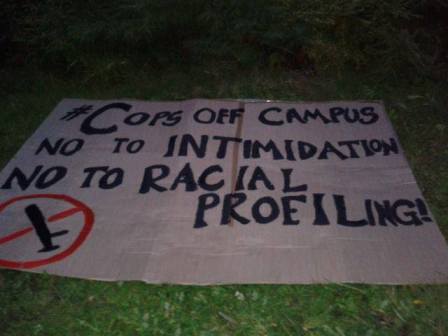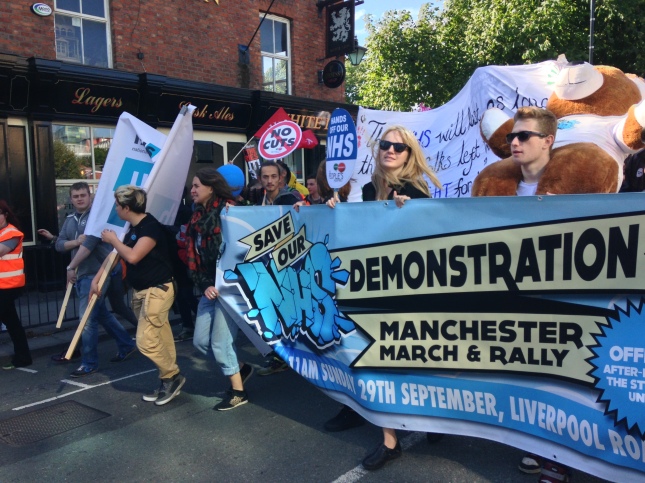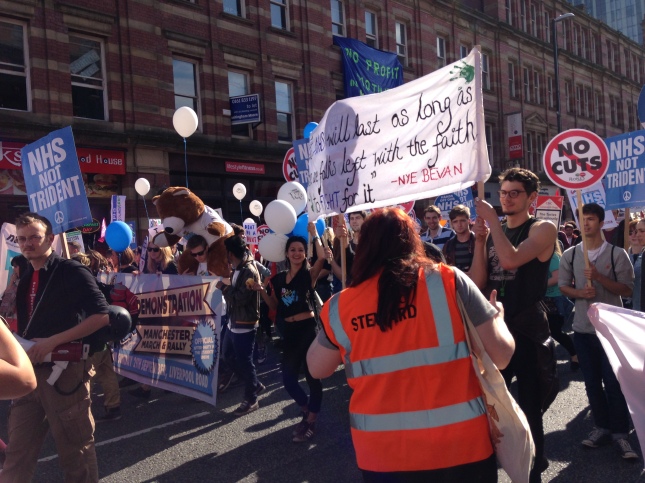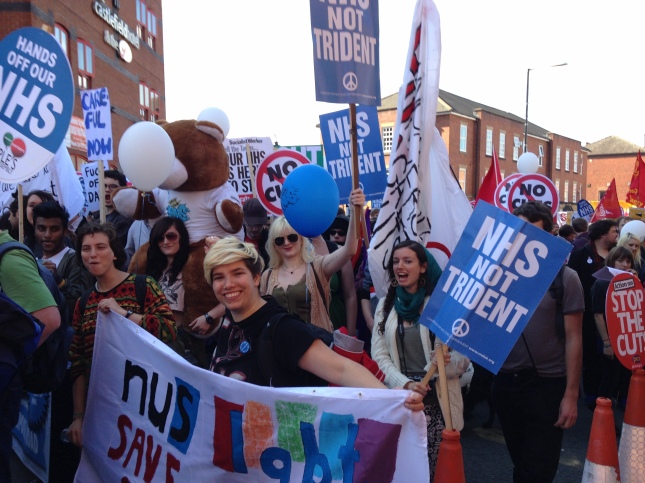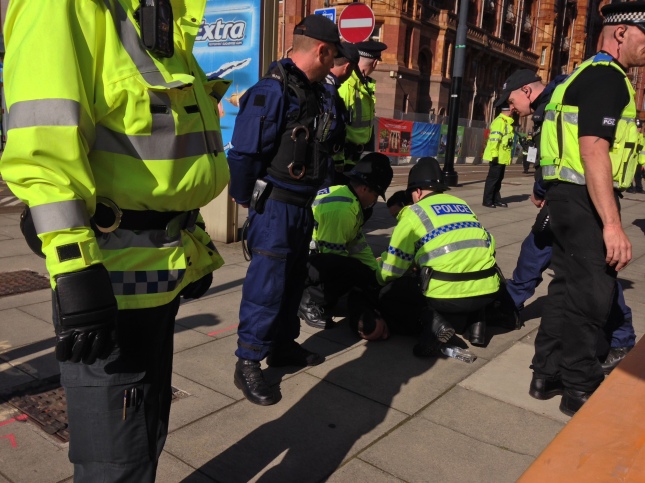

Back in November, I was lucky enough to attend the annual conference of the Danske Studerendes Fællesråd at Roskilde University, just west of Copenhagen. I was invited to speak on the British student movement’s history of fighting against tuition fees, with focus on the 2010 student protests, but also the history of free education campaigns throughout the 1990s, 2000s and 2010s, and the changes in NUS policy with successive governments’ introduction and increases in tuition fees.
Something that was rumbling under the surface at the time, and has since come to a head in street protests in Copenhagen, was growing concern around changes to the Danish higher education funding system, or the ‘SU’.
The presentation I made can be replicated by anyone, I’ve written a speech and a Prezi which fit together, and can be accessed here(Speech with slide references) or below (here). The full Prezi is here: (link to Prezi)
Denmark, the UK, and Politics in the Student Movement
There are some major differences between the Danish student movement and the UK. Currently, Danish students still benefit from free higher education, with no fees to pay on undergraduate or postgraduate courses for Danish nationals, and most EU students too. This means that the political landscape, and indeed the entire frame of reference for Danish student activists, is very different. Whereas in the UK, we have strong left/right factions who are polarised by very different views on the funding of higher education (for example, the National Campaign Against Fees and Cuts, the Campaign for Free Education taking a free education position, as opposed to Labour Students policy for a graduate tax), in DSF people were keen to tell me that ‘big politics’ is largely kept out of the student arena. That is not to say that left-right distinctions do not exist, but perhaps they manifest themselves in ways which we would find a little surprising (in attitudes to individual policy, rather than in overt party factionalism, perhaps).
In the session I ran, I gave a history of the anti-cuts movement in the UK, since the mid 1990s. At the time, the Campaign for Free Education (CFE) formed to defend student grants, which Labour Students (aka ‘NOLS’ and the current leading faction of NUS) wanted to abolish in line with New Labour’s comparitively right wing plans to introduce tuition fees for students. I explained the history of the free education platforms within the left in NUS (and outside of it on the streets or in independent structures, often far more influential in the student movement working away from the NUS bureaucracy), and the various groupings involved.

DSF’s president Jakob Lindell Ruggaard (and me in the background, not understanding any of the debate in Danish)
What was most shocking to the attendees at the session was that the UK’s student union – the NUS – could ever have taken what they saw as a clearly regressive step on student finance. It was simply incomprehensible to them that a body that is – by definition – meant to protect student welfare, could put the interests of the political party its leadership are members of, over and above the interests of the students it represents. It was actually quite hard for me to explain this to them, as (as I stated earlier) party factionalism appears to be largely kept out of student politics in Denmark. Several delegates said to me, “yes, people have their own politics of course – there are socialists, democrats, anarchists…but we are here to talk about defending student rights, and work out what is best for them”.
Of course people there have different views, and of course they can be characterised as more left wing, or more right wing. But it seems that people are more willing to be persuaded to the others’ views by a convincing argument. Their democratic procedures work through a combination of compositing, committee discussion, consensus and voting. So for example, a number of opposing motions will be put up on a policy issue, the opposing groups (e.g. from different campuses) will meet together to see which parts they can agree on and composite together. Then in a whole conference debate, the views will be thrashed out back and forth, and more persuasion and compromise takes place. If the conference is unable to reach consensus, then an outright vote will be taken.
This way of debating policy was very alien to me. I’m not a huge fan of consensus decision making as it takes place in the UK student movement at the moment, popularised through groups such as Climate Camp, People and Planet, and in student occupations. I find it hinders sharp debate, and softens arguments. However, the debate in this conference did seem pretty sharp, and I was impressed with the conviction of those who disagreed with the majority position on the debate I followed in sticking to their guns.
Experiencing this cooperative-style environment gave some background to the all-round shock of delegates at the NUS’s position on tuition fees, its prioritising of the Labour Party whip above fighting for student rights, and it certainly gave me some perspective.
Of course, ‘what is best for students’ is not the same to an anarchist as to a social democrat, and this is where I felt a little bit lost. There is no de facto truth of what is best for students (or anyone) separate from broader politics, because our views about that are shaped by our economics, our understanding of power, of rights, and of what society should look like. A neo-liberal will genuinely think that a free-market higher education system is best for students.
A previous visit to Denmark, where I met with a local trade unionist and discussed the Danish labour movement and the left wing parties gave me a similar impression, and again, may help to explain this difference of perspective. The Enhedslisten party (the Red-Green Alliance) was a coalition of several far left parties – formed in 1989 by the Left Socialist Party, the Communist Party of Denmark and the Socialist Workers Party, and by independent socialists. What was interesting to hear is that many divisions between these parties have since disappeared, and many factions have dissolved. My comrade from the UK and I tried (and failed) to imagine this sort of thing happening in the UK, recalling the disastrous end to England’s Socialist Alliance, which folded after the largest grouping – the Socialist Workers Party – abandoned the project to work in RESPECT, where they had more control. It seems that the UK political style of aggressive(?) debate and factionalism doesn’t translate so well into the political systems in other European countries. I’d be interested to hear from those of you with more experience in European politics than me on your thoughts on this.
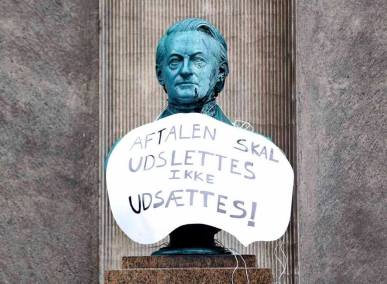 Denmark Student Protests and the SU Reform
Denmark Student Protests and the SU Reform
Since the conference, a number of developments have taken place over the matter of the ‘SU’. The SU is Denmark’s student grants and funding system, and compared to the UK, is extremely generous (and rather more progressive in several ways than ours was even before it was removed) – this is a good thing, in spite of the right wing Danish rhetoric that it ‘rewards laziness’. There was a wave of student protests in Copenhagen by students from across the country, around government attempts to reform and restrict the SU. These restrictions are largely around attempts to limit the amount of time a student can take to complete their course, and still receive a grant. For example, many students choose to complete their degree over more years, so that they can take up extra-curricular activities, sports, or student politics. Some do so simply in order to spend more time on their studies, or perhaps to accommodate their access requirements. The government policy, passed in June 2013, is explained in depth here http://dsfnet.dk/BlivAktiv/Kampagner (use Google translate).

For Danish students these changes mean a huge attack on their rights and freedoms – not just to a free education, but to one they have up until now been able to shape and manage themselves. In November and December 2013 Danish students took to the streets to protest the SU Reform.
It may seem a world away from the largely free market student finance system in the UK, but it is vital we fight for free education and the protection (and extension) of student rights across the world. The NUS leadership in the UK has consistently failed students in the UK, by prioritising right wing Labour Party policy above free education. That is not to say that it is a problem that party politics are part of the political climate in UK student politics – I feel it is a far more honest way of operating, and encourages people to think about where ideas stem from, and the bigger picture. Student issues are not isolated from the rest of society – political and economic pressures have an impact on student issues and cannot be ignored. Only recently, international students in Denmark have been attacked in more specific government reforms – in the UK, anti-migrant rhetoric from the likes of UKIP has meant huge attacks on international students. It is important that ‘big politics’ is part and parcel of a healthy student movement, because education policy is not formed in a vacuum. However, it is right that student unions’ priorities should be to defend and extend the rights of students. When Labour Students sold out over tuition fees in the 1990s, it was not wrong because they involved their party politics, it was wrong because free education is a right, and a union’s job is to protect and widen access to education, not support marketisation which inevitably creates barriers to that access.
The Fight Against Tuition Fees in the UK
Slide 1
A few weeks ago, the UK’s richest universities, called the Russell Group, agreed to campaign for the limit on tuition fees to be lifted from £9,000 to £16,000 (141,944 kr) a year.
A few years ago, the limit on fees was about £3,000. Until 2005, it was £1,000. Just sixteen years ago, undergraduate university education in Britain was completely free.
A big part of the story of how this is happened is about the political failings of the organisation whose executive I sit on, the National Union of Students – NUS. Unfortunately, these are failings that are continuing today. But the NUS is not the whole picture. The student fightback against fees has taken place, regardless – often in spite of the actions of the NUS.
As is probably already clear, what I am going to say is very much not the official NUS position. It is a minority position within NUS.
Slide 2
In 1997, after 18 years of right-wing Conservative Party rule, the Labour Party came to power with Tony Blair as prime minister.
Then as now, NUS was made up of a number of different political factions. Since 1982 it had been run by the student wing of the Labour Party. This faction, following the defeat of the workers’ movement by Margaret Thatcher in the 1980s, gradually became less and less radical, in line with the leadership of the Labour Party.
NUS had for many years defended the principle of free higher and further education, opposed cuts to student maintenance grants and demanded grants that were enough to live on. This was summed up in the slogan “free education”.
Slide 3
But in 1995, as the end of the Conservative government came nearer, the Labour Party students moved to drop NUS’s support for free education. They did this in order to make life easier for Tony Blair’s government, and to help their future careers in the party. They were opposed by a left-wing organisation, led by socialists, called the Campaign for Free Education or CFE, which existed both as a grassroots campaign and a faction in NUS.
In 1995, NUS called a special policy conference to discuss these issues. At this conference, CFE won, and NUS policy didn’t change. In 1996, however, the leadership won the change in policy. NUS now had no clear policy on fees and grants.
When Labour came to power, they announced they would introduce tuition fees of £1,000 (9,000 kr) a year, and abolish grants, completely replacing them with loans.
Slide 4
NUS accepted these changes. It refused to call any national demonstrations. This was done by CFE, which mobilised thousands of people on the streets. There were also direct actions and university occupations against fees. Since tuition fees were at that time paid upfront, CFE also attempted to organise a campaign of students refusing to pay – but NUS strongly opposed this campaign. It helped Tony Blair implement his policies.
In 1997, the government and the NUS leadership said that introducing fees would be a permanent settlement. The student left warned that it would open the door to a market in higher education, creating pressure for higher and higher fees. The left was right.
In 2004, the Labour government raised the limit on fees to £3,000 (27,000 kr). They got this through Parliament by a majority of only five. If NUS had campaigned at all, the increase would probably have been defeated.
The Blair government was expanding higher and further education. But they were doing it on the cheap, and by introducing a market. The student movement should have demanded expanded education but free, properly funded and provided as a public service.
At the same time, fees were becoming more and more common in further education colleges, where some sixth formers and many older working-class students study. NUS did nothing about this either.
In 2003, many, many thousands of university, college and school students had organised demonstrations, occupations and walk outs in protest against the invasion of Iraq.
Slide 5
But after that the student movement in Britain went quiet for a fairly long period of time. For instance, a left-wing demonstration for free education in early 2009 only attracted 700 or 800 people. When NUS called demonstrations, which wasn’t often, they would only attract a few thousand people. In this period the leadership of NUS and of many local student unions became more and more conservative, and NUS’s democratic structures were repeatedly cut back, while its bureaucracy became bigger and bigger, introducing more commercial enterprises. To many students during this period and to today, ‘NUS’ is now a brand which means discounts on shopping, rather than a political organisation.
Between 2006 and 2008, delegates at NUS conference briefly adopted support for free education again. But the NUS leadership just ignored the policy, didn’t campaign for it and then got rid of it.
Slide 6 (title)
In 2009, things started to change. There was a wave of university occupations in protest at the Israeli attack on Gaza. And with the capitalist economic crisis and, after 2010, a Conservative-Liberal coalition government making cuts, student struggle began to revive.
Slide 8
Campaigns against course or department closures and anti-cuts groups started to pop up on campuses. The activists winning these groups started winning some student union elections. And there was a revival of protests and occupations, some of them quite impressive.
Slide 9
This led, in early 2010, to activists founding the National Campaign Against Fees and Cuts, which I am part of. Like CFE, the NCAFC now exists both as a campaign and as a faction in NUS. We are the biggest left-wing faction on the NUS executive, with five people out of about 40. We also run some student unions.
Slide 10
In 2010, the Conservative-Liberal government announced it would raise tuition fees to £9,000 (80,000 kr) and abolish Education Maintenance Allowances, which were living support given to poorer sixth form students.
In November 2010, the NUS called a national demonstration in London and the turn out was huge – about 50,000. At the end of the demo, thousands of students attacked and smashed up the Conservative Party headquarters at Millbank by the river Thames. After this NCAFC put out a call for a national day of protests and walk outs – and a huge student movement exploded.
Photos Slide
For two months there was a massive wave of university occupations, school and further education college walk outs and demonstrations. At one point something like fifty universities were occupied and overall hundreds of thousands of people must have participated in the movement.
Millbank Photo
Slide 11 (white slide)
It was the biggest student protest movement in Britain for at least fifteen years, and possibly more like thirty. NUS stood aside from all this, in fact condemning the protests. It certainly did nothing to help them continue, develop or win.
At the end of the movement NUS President Aaron Porter was chased through the streets of Manchester by angry student protesters. He claimed he had suffered anti-racist abuse, and this was then disproved. After this, he resigned. He was the first NUS President for many, many years not to stand for a second term in office.
Slide 12 (CDE case study)
“There had been a bit of a vaccuum since the ENS collapsed, it was a case of bringing everyone together. The Cambridge Left Group set up some meetings after the Brown Review, there were about 80 people at each. I chaired a meeting where we decided to set up Cambridge Defend Education (Oct 2010). The anti cuts group and the SU mobilised people to go on the NUS demo, but the anti cuts group did a lot of the leg work, getting people on the coaches.
As soon as [NUS President] Aaron Porter condemned the Millbank protests, people were furious.
We went into occupation the week after the NCAFC day of action in late November 2010 for 11 days. It was the biggest occupation Cambridge has ever had. On an average night there were 200 people there, but thousands passed through it every day. We held cultural events and gigs in the occupation too.”
Slide 13
What since?
Since then, NUS has continued on the same course. In 2011, NUS did not organise a demonstration, leaving it to NCAFC to do it. It doesn’t organise much campaigning at all. The NUS leadership says it is against the devastation which the government is inflicting on workers and students in Britain, but it does nothing serious to fight against it. It will not even say it opposes all cuts, let alone campaign seriously against them.
When there are big student mobilisations, for instance earlier this year at Sussex University near Brighton, in defence of workers’ rights, NUS is nowhere to be seen.
A month ago, there was a massive demonstration in Manchester in defence of our National Health Service, against the government’s push to privatise it – with about 50,000 people. NUS brought only a few of its national officers – far more people were mobilised by the student left.
NUS continues to oppose free education and a fight against tuition fees. We can assume that its leadership will not seriously oppose the new push by the Russell group to raise fees either. So in the UK, students face a tough battle both within their own union, and trying to build a campaign against fees too.
Almost all the NUS leaders are members of the Labour Party, yet they won’t even make demands on their own party about what it will do when it becomes the government. Like their predecessors who helped Blair introduce fees, it seems, unfortunately, that they are more concerned about looking respectable and about their future careers.
As a result of all this huge numbers of student activists now view NUS with contempt. To make sure that this does not become a problem in the structures of NUS, NUS democracy has been further and further narrowed and blocked up.
That is why the National Campaign Against Fees and Cuts continues to organise, in NUS, in student unions, on campuses and on the streets.
Our key ideas are:
1. Free education should be a right for everyone. We want education to be a public service, not a commodity, and so we oppose all tuition fees and demand decent grants for all students.
2. There is plenty of money in society for decent education and services for everyone. But that money is in the wrong hands. We say “Tax the rich” and “Expropriate the banks”, so the wealth they have taken from the working class can be used for the benefit of workers and students, not an elite.
3. We will only win these things through taking the most militant possible action, including direct action such as occupations.
4. Our goal must be to bring down the Conservative-Liberal government and pressure the Labour Party to commit to abolishing tuition fees, reversing cuts and so on.
5. The central axis of student struggle in Britain right now is solidarity with workers’ struggles. Universities and colleges are being restructured to drive down workers’ wages and rights. There are numerous workers’ struggles being fought against this, and NCAFC members are at the forefront of many of them.
We want to reorient the whole student movement, including NUS, so that it can become a powerful force to stand up for students’ rights. Opposing all tuition fees, and demanding free education, is a crucial part of that.

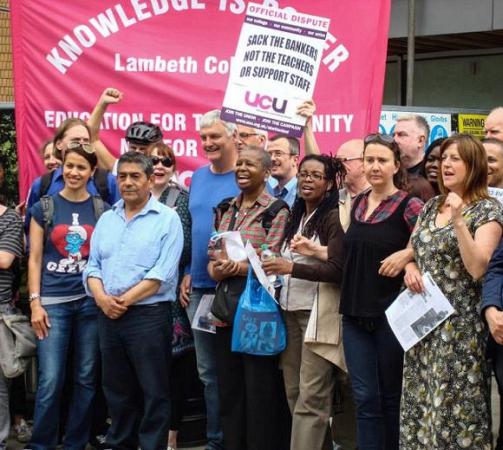







 On Sunday, I was asked to speak at the
On Sunday, I was asked to speak at the 